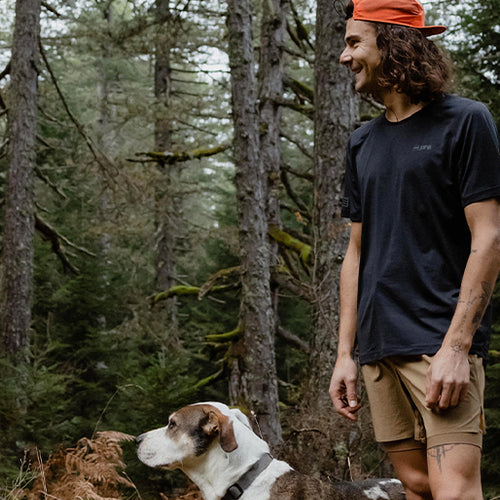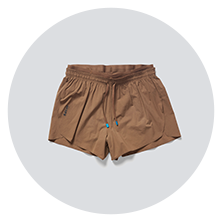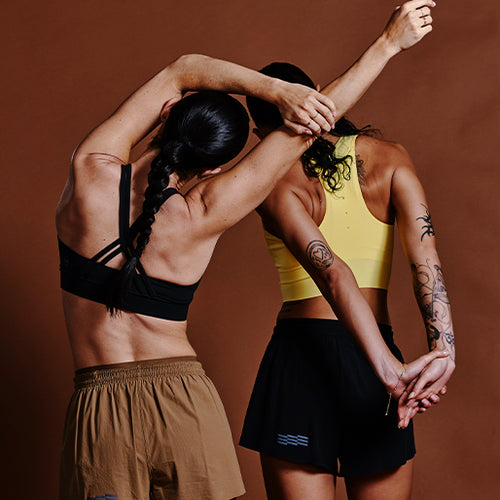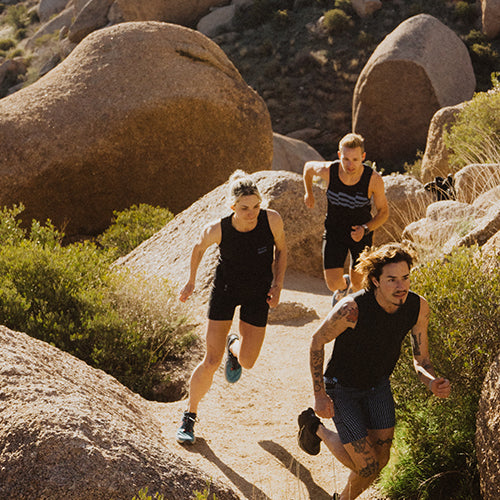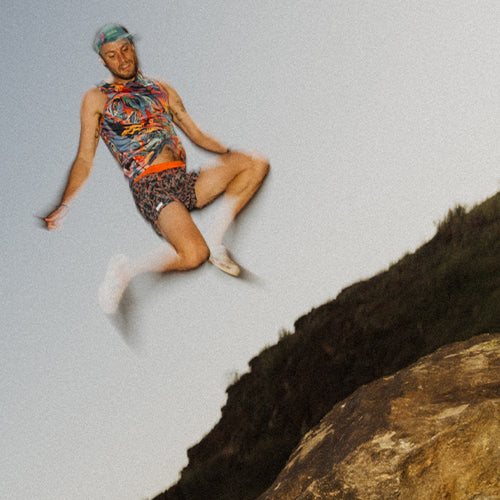WORDS
Justine Fédronic
PHOTOS
Jess Barnard
When Field Team member Justine Fédronic realized running had become more of a stress than a joy, she began a journey to find renewed purpose.
In 2016, I earned the opportunity to compete at the Rio Olympic Games in the 800 meters. It was surreal to live a lifelong dream, to be fully present in the moment while acknowledging the work it represented. I crossed the line and waited- to feel elated, changed, superior to whom I had been before. I found my brothers’ faces in the stands. I hugged my coach. I explored Rio with my family.
And yet, the reality was an unexpected, lingering emptiness. My buildup to the Games had shattered my fantasy narrative. After a long and traumatic hamstring injury, I’d clawed myself back to my best race fitness ever, like the model resilient athlete I was. I spoke about it in interviews, on television, on social media, as if I had definitively overcome. And then, during the Olympic Trials that qualified me for the Games, my knee mysteriously ballooned with inflammation, and I spent the weeks leading up to the race day of my dreams just hoping to wake up without pain. I was in an unhealthy romantic relationship with another athlete, both of us desperately clinging to the prewritten mythical life of the Olympian. My training partners and best friends hadn’t qualified- I was slogging away solo at practice, trying to celebrate my experience while consoling them. And then the trip to Brazil, the race itself: I desperately wanted to love the experience, to feel true fulfillment and contentment. But I didn’t. It still feels shameful to say that. I’m proud of myself, and do have the beautiful highlight reel to share. But overwhelmingly, I felt jaded, anxious, depressed, broken.
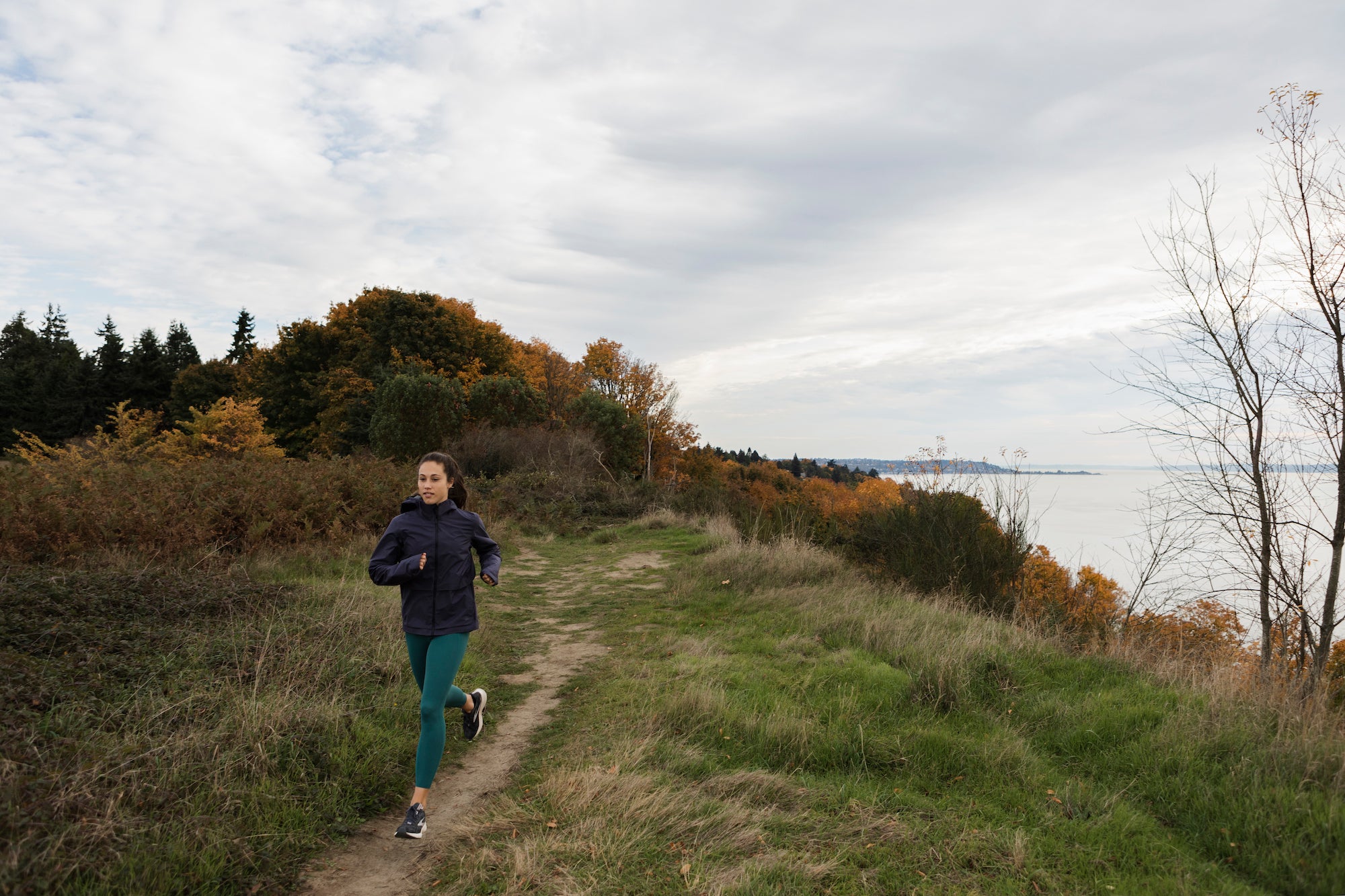
For the next four years, I searched for solutions to heal my relationship with the sport. I raced in beautiful new places, made lifelong friendships, worked with a therapist. I reflected on my whys - my roots in the running world. I’d grown up bi-continental and multicultural, and out of necessity, I’d spent my life learning how to be both a cultural chameleon and translator: for language, but also culture, traditions, and perspectives. My self-identity has been complicated and heavily influenced by the transitions between each of my homes and communities. I have three passports, false symbols of belonging. Once I found running, it was a constant, no matter where in the world I was. It was what connected me to my people and places, how I could introduce myself no matter where I was in the world.
My first memories of running fast occurred on the playground in first grade. My family and I had just immigrated to the United States and we spoke absolutely no English. I couldn’t communicate with my classmates, but I could excel at tag. I was Justine, the playground superhero. For the next 23 years of my life, running defined who I was. I was part of a community of ferociously resilient women. I rode the rollercoaster of the elite athlete: I stood on podiums, I was often injured, I represented my country, I was always exhausted. All that fit into the mythos of my identity: sacrifices for the big moments of athletic success, for the platform it provided. Throughout my career, running was an emotional outlet, a form of expression, and a source of camaraderie and self-worth. Most importantly, it was a way to show myself and other multicultural immigrant women that we do indeed have our rightful place in the world. It was a place I had fought to belong, where I could forge a path for others like me to belong.
 
|
 
|
 
|
In March of 2020, the world was facing ambiguity and change. Running fast felt like it mattered even less. There were talks of canceling the Tokyo Olympics, we trained solo and masked around the confines of our neighborhoods, and I was furloughed from my teaching job. Out of panic and necessity, I started developing a virtual design thinking workshop for kids. The concept of the workshop was to guide them through the design and build process for a product or service to improve their family’s stay-at-home experience. I was working with these kids to internalize and practice the concepts of needfinding, empathizing, prototyping, failing forward … all the key ethos of human-centered design. More and more, I felt like a fraud. After all, I was a human, I was increasingly unhappy, and yet I had not put any of these concepts into practice for my own life. So I decided to try- to prototype not going to practice, to find a new mission, to dare to fail forward.
It was comedic at first - after all, for my entire adulthood, my days were pinned around getting up in the morning, preparing for practice, and making my heart beat and my lungs sear. If I tried to stray from that, I was unfocused and guilty the rest of the day. And then I would feel ridiculous about feeling guilty, and stubbornly insist to myself that I just had to practice not going to practice. I’m still sorting out how much movement my body and mind want in a day, and opening my energy to new forms of exercise. Retirement is a funny word, especially when you’re 28. I still don’t like to say it out loud, and I never made a big announcement to my community. I just gradually evolved into it.
My unhappiness as an athlete came from several sources: constant concern for my physical health, a developing unwillingness to put myself through further pain, worry I couldn’t engage with the world around me because of my lifestyle, financial insecurity, my waning self-worth as dictated by the running industry, the growing urge to use my privilege and platform to help the world. While elite athletes are very reliant on their community, the day to day practice of preparation is a pretty selfish life. My brothers are playing a set at an exciting venue in San Francisco? Sorry I can’t go, it starts at 10pm and I need to sleep. Sorry I can’t go to your wedding, your graduation, the family vacation. Sorry I’m too tired. Sorry I can’t, I don’t want to accidentally hurt myself playing pickup soccer. Sorry we can’t open Christmas presents yet, I have to go for a run first. I do want to volunteer for your non-profit, but sorry I need to go to practice.
|
“I wanted to love running again. To step out the door with joyful intent instead of apprehension. To feel free, to feel empowered by my own body’s ability to transport me across cities and trails, to run in communion with people simply to feel togetherness.- Justine |
 
|
When I first started running competitively, I was confident in these choices and in the balance I could create within myself and my community. As I grew, my mission changed from “running as fast as possible” to include “running to help others”, but the reality of chasing the first mission while supporting myself eclipsed the possibility of the second.
It’s not that I hated running, it’s that I was close to hating running. And I wanted to love running again. To step out the door with joyful intent instead of apprehension. To feel free, to feel empowered by my own body’s ability to transport me across cities and trails, to run in communion with people simply to feel togetherness. To give myself rest when I needed it, to stop to admire a view or listen to the wind in the wildflowers.

Evolving out of my identity as a professional athlete has been unexpectedly challenging. I’m learning how to navigate the world with renewed purpose and joy, how to give to my communities, and how to honor the facets of my identity. I’m lucky that for years I was blindly passionate about what I was doing, and that I was good at it. I’m learning to try new things without the expectation of immediate mastery, learning how to develop passions as a beginner, to fail forward. I’m learning how to navigate feelings of urgency, that it’s not too late to start from scratch.
I still run, when I feel like it. I don’t run to be the best at it any more. I run to feel rooted in my places, to enjoy the outdoors, to breathe with my people, to celebrate the many communities I get to visit and be a part of. I’m embracing the part of running I loved the most: its ability to foster connection. To self, to place, to community. I run the trails around my homes with a fresh eye and appreciation, because I get to use my body to take my mind exploring, and not because I have to log miles each day for a faraway finish line. I get to connect to the lands of my ancestors and to the lands of my present in a pure and immersive way. I started a functional strength series for women of color, to share the expertise I’ve gleaned from years of training my body to run fast and healthy. To share the joy of movement and movement in community. And most days, when the run calls to me, I step out the door without a grand plan, without imposed control - my feet will take me where they want to go.







